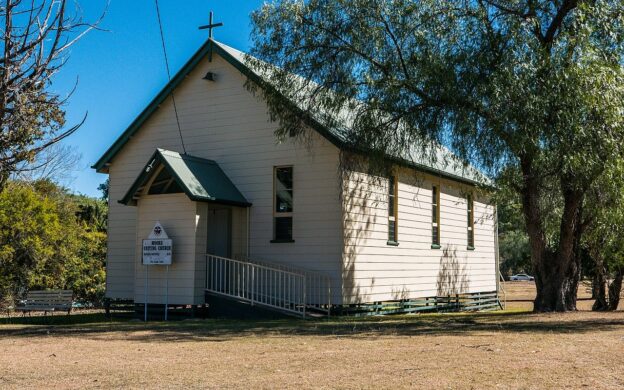It is October, which for pastors is Clergy Appreciation Month. Recently I polled clergy on their experiences of Pastor Appreciation in the midst of ministry. The results managed to surprise me.
I was curious to know answers to what I thought was a fairly straightforward, simple question: what’s one of the most meaningful gifts or gestures you received for Pastor Appreciation? As an afterthought, I included – or an awkward gift or gesture?
It was surprising to see the percentage of clergy who have never experienced any organized appreciation initiative, alongside the number who (though technically counted as having received Clergy Appreciation) received maybe one or two cards, years prior.
The point of surveying clergy was not to reinforce an idealized perspective of pastors. I’m rarely surprised by pastors, though it happens from time to time. But for every self-promoting or self-aggrandizing or corrupt or predatory pastor I’ve known, I’ve known many more who continue to show up week after week because they love God and they want people to see God, love God, and love others.
However, clergy burnout rates in North America are quite high, while available Sabbaticals are often under-utilized; a number of pastors leave ministry, and clergy mental health is frequently under assault. Recently, a tragic case of a high-profile pastor’s suicide hit the news. The factors contributing to burnout, clergy drop-out rates, and mental health struggles are complex, and no one event or initiative is a cure-all. Congregations should have high expectations for their pastors’ integrity, hard work, and growing maturity and leadership. Congregations have a right to expect to be treated with care, honesty, character, and respect.
But some of the gestures clergy have pointed out as most meaningful also reflect the particular challenges they face:
- A pastor who receives a perceptive personal gift feels seen and known in what is often a lonely role
- A pastor whose kids are included as recipients in Clergy Appreciation sees the hidden family cost and sacrifice being noticed and honored
- A pastor who receives a deliberate daily prayer initiative senses renewed energy to face daily spiritual battles for which they crave Divine wisdom and insight
- A pastor who receives specific notes mentioning examples of the impact of their ministry fights the fear that they’re not making any difference through the waves of criticism, tragedy, and pressure they encounter in the pews
In my informal poll, I reached out to North American Protestant Christian clergy, weighted heavily toward Wesleyan Methodist pastors working in local congregations (District Superintendents, Bishops, or General Superintendents were not included this time). They represent regions across the United States. The group includes both women and men in active pastoral ministry as solo, senior, or staff pastor or chaplain. Among responding clergy were Caucasian, Black, and Latino pastors. Pastors from multiple denominations responded, including AME Zion, AME, United Methodist, Wesleyan, Nazarene, and Episcopalian. Congregation size varied, as did denominational form of organization – congregational voting on a pastor vs episcopal appointment by a Bishop.
- Roughly 65% of respondents have experienced some kind of recognition, gift, token, or event for Clergy Appreciation month, which is good. However, this ranges from getting a Hallmark card or gift certificate once or twice from individuals in a congregation, to organized events, lunches, gift baskets or sporting events tickets, to each staff member receiving a thousand dollars in gift cards.
- About 20% of respondents had never served a congregation that observed Clergy Appreciation month but had received formal, organized recognition or appreciation at other times or milestones, like a milestone anniversary year at a congregation or when the pastor was moving away.
- About 15% of respondents had never served a congregation that organized a formal recognition or appreciation initiative, either during Clergy Appreciation Month or at any other time.
Regardless of the monetary value of gifts, respondents repeatedly affirmed that some of the most meaningful gestures were personal, or illustrated what each member was able to give in their own capacity, or expressed the specific impact a pastor’s ministry had made.
Further, a couple of respondents explained that Clergy Appreciation is rarely or never observed in some particular contexts: church planting (where a congregation is new, not yet established, and often is completely unaware of Pastor Appreciation month), and chaplaincy positions (where a clergyperson is appointed outside of a traditional congregation in settings like hospitals/hospice, law enforcement or fire departments, athletic teams, or the military). For chaplains and church planters, there may be a higher likelihood of falling through the cracks, despite their roles being particularly heavy with crisis encounters (chaplains) and with entrepreneurial launch risk (church planters).
An aside: not all clergy want Pastor Appreciation recognition – sometimes they fear it looks self-serving to visitors, or they’ve grown to dread resentful comments about needing a salary at all or interactions that feel quid pro quo. Most pastors wouldn’t want the kind of “PreachersNSneakers” attention some celebrity pastors have been receiving about the perception of their wealth or what they do with it. But the vast majority of pastors serve congregations of fewer than 500 members, and the majority of those serve in churches with 200 members or fewer, so it’s unlikely the rural Illinois pastor down the street is rocking a $4,000 pair of shoes while layoffs are occurring across town.
While certainly care should be exercised, pastors as effective leaders must work toward being able to inhabit a place of comfortable, appropriate vulnerability. And that’s what being willing to receive something is: you are allowing yourself to be impacted by another person. This is a vital trait for clergy to exercise, who so often are the ones in the position of giver – giver of time, resources, counsel, insight, and leadership. When you let people give, it breaks down walls and barriers easy for wounded clergy to keep up; it reinforces to congregations the value of expressing and communicating gratitude, positivity, and appreciation; and it allows people to give from whatever scant resource they’re able. If you tell a church you don’t “need” anything from them, you’re robbing the five-year-olds of the opportunity to practice showing gratitude through their Crayola art. You’re telling the 85-year-old that she can’t do anything valuable for you, that she has nothing of worth that you need. And you’re telling people with limited income that their banana bread doesn’t have a point – when maybe that’s the best thing they have to give. So let them give it. Or else never preach on the feeding of the 5,000 or the widows’ mites again.
Here, then, are a few takeaways from pastors’ responses on what Clergy Appreciation gestures have been most meaningful (or sometimes most awkward). They’re relevant to leaders like District Superintendents or Bishops, active and retired pastors, and laypeople wondering where their congregation falls compared to other churches.
Pastors’ experience of Clergy Appreciation Month varies so widely it seems almost solely shaped by individual congregational lay leadership.
Church size, area of the country, denomination – none of these determine the likelihood of whether or to what extent a congregation will observe Pastor Appreciation. No one leadership style or pastoral personality or temperament seemed to shape the likelihood of whether or not a particular clergyperson had received gestures of appreciation. Sometimes length of tenure appeared to have some correlation – the longer a pastor had stayed in once place, the more likely they were to have been honored in some organized or deliberate way.
Pastoral Appreciation habits on a church-by-church basis seems further illustrated by the fact that some churches don’t observe any formal recognition of Clergy Appreciation Month in October, yet have a healthy practice of regularly encouraging their pastor at other times of year. Yet rather sadly, for at least one minister, a congregation with retired denominational leaders and pastors attending was the only church they served that hadn’t recognized Clergy Appreciation (perhaps illustrating the principle that, “a prophet has no honor in his own hometown”).
When denomination, region, and church size don’t significantly determine whether or not a congregation organizes regular Clergy Appreciation initiatives, the spectrum of experiences is quite wide. Lay leaders exercise a great deal of influence and leadership, and factors like congregational culture and health likely inform attitudes, proactive communication, and a sense of pride, ownership, and gratitude.
Consider some statements from currently active pastors:
“I did not even know it was Pastor Appreciation month. I do not think I have ever received a gift for it. Is that weird?”
“I only recall having received one gift from a lay person at one church I’ve served. It had a gift card, which was nice!”
“Church plant congregations have no idea about Pastor Appreciation month!”
“The best was tickets to an NFL game. It was on a Sunday, so the church gave us the weekend off! It was really nice.”
“My church decided to make Pastor Appreciation a really big deal one year (I had been at the church for six years). Normally, I might get a card or a gift certificate from random church members. This particular year, they gave me a different surprise every Sunday during October. The first week at the end of the service they gave me a big bucket full of goodies. One week, they gave me a big box full of notes of encouragement. So very thoughtful. They also bought a new desk for my office, repainted it, re-carpeted it, and redecorated it. They also gave me a framed picture of my face made out of words that describe me.”
“They gave each of us and the lead pastor over a thousand dollars’ worth of gift certificates to the dinner theater, the fanciest steakhouse, and a bed and breakfast.”
There are a couple of dynamics likely to produce an awkward Clergy Appreciation experience.
There are a multitude of ways to show appreciation with sensitivity, creativity, and personality, as some beautiful examples below show. However, a couple of situations can create awkward Clergy Appreciation experiences.
When a congregation recognizes a Senior Pastor to the complete exclusion of other staff members, it can be awkward for everyone. Consider these experiences:
“Only recognizing senior pastors makes it look like the congregation doesn’t think the other pastors are doing ‘real’ ministry.”
“My church has this sweet sign, Our Pastor is #1! A bit awkward though since it’s singular, and we have two pastors on staff.”
When themed gifts pile up for clergy who have to pack and move regularly. While teachers receive apple-themed decor, keepsakes, ornaments, dishes, and more, pastors sometimes have a similar challenge.
“My spouse gets awkward ones all the time. Just random crosses and church-y things that will collect dust.”
“Please, no more crosses or Bibles. I’m set!”
When social insensitivity potentially sours a well-intended gesture, pastoral appreciation shifts from being relaxing to presenting new challenges to be solved.
“It was great when people offered to watch our kids so we could have a date night – until it was a person we were not comfortable letting care for our kids. Declining was awkward in those moments.”
“One thing I’m aware of in our social media age is that some pastors are going to be in pain as they watch other churches shower their pastors with gifts, and then watch their church go silent. Pastors, out of a sense of excitement and gratitude, post it on social media. Sometimes, despite the good intentions, I wonder if it leads to comparisons as one pastor compares his $25 gift certificate to another pastor’s trip to Hawaii.”
Sometimes the awkwardness has a more sinister edge, so if your pastor seems a little wary during Clergy Appreciation month, remember occasionally there are circumstances going on behind the scenes, as with one respondent in active ministry:
“I have a stalker who is sending me things. The Superintendent is about to have a cease and desist letter sent.”
Despite the number of ways expressions of gratitude can become awkward, take them as helpful notes but don’t let them keep you from showing appreciation to your own pastor. As you’ll see below, even a short note can stick in the clergy mind for years and encourage a tired pastor to keep going.
The most meaningful gifts were personal, reflected individual ability to give from the resources they had, or included notes about how their ministry mattered or the impact of their work.
No one goes into ministry for the salary; still, it is moving to see what moves the average minister. Consider these creative gestures from a variety of congregations of varying size, with varying resources, and why they mattered to the pastors who received them:
“One year, our board planned an entire weekend of services including kids’ church, youth, preaching, music, scheduling volunteers. Our staff was invited to simply come and participate. It was amazing to come without responsibility and be a part of our morning worship services. It truly was a gift of time and appreciation. Imagine a whole week that our staff was able to realign our efforts because we didn’t have to plan weekend worship services. It was great!”
“I personally appreciate the thoughtfulness more now than I did in years past. Having gone through a tough pastorate, acts of service and love mean more to me than they once did.”
“One of the most meaningful gifts I have received for Pastor Appreciation month was a picture of my grandmother framed with a poem written by one of my members. My grandmother passed two years ago during Pastoral Appreciation month. The gift made me cry.”
“Honestly the money and gifts are always appreciated. But when people have written about the difference one has made in their lives…those make everything so worth it.”
“Our church does prayers for your pastors for the month of October with a prayer prompt each day. A lot of the cards and notes I get say that people are praying, and I believe they are, especially with the prayer prompts. They include our family in the prayers so that means a lot.”
“I had a church member who knew that I like deer meat, but also that I don’t like to hunt. He killed a deer and called me to pick it up, but all I had to transport the deer was my small compact car. So I stuffed this deer carcass into the trunk of a Corolla to have it processed. It was all pretty crazy! But it was an incredibly kind gesture.”
“The most meaningful was an appreciation lunch; there wasn’t enough in the budget to give cash gifts, but the members still wanted to show their appreciation. They decorated the hallway and tables with signs. The children made cupcakes for us. The most meaningful part was the gesture from the kids who made cupcakes, because it was the sense that everyone has the capacity to give – they gave from their hearts and their own means.”
“The most meaningful – I think what people have said in the cards they give me when they express their appreciation for my ministry, and the support they offer.”
“When I was single, one congregation brought me meals every day for a month.”
“This year they gave me a gigantic card that had lots of color and glitter, it was so me! I think that’s what I like best, it is so hard to get surprises past me, and they always seem to do it.”
“We’ve also had people get our kids gift cards, to take the family out for dinner – Steak n Shake and Wendy’s – it made them feel special, that they could ‘plan’ and ‘prepare’ dinner.”
“My most used gift – someone gave me and the other pastor each a large Yeti cup with our names on them. I used it all the time and never worried about losing it on Sunday.”
“Stained glass from old church windows (when they remodeled or repaired windows). We have these from two different church buildings. I get emotional just thinking about it.”
“I remember my children lighting up when they found a basket filled with goodies on the porch. It makes me happy when my kids feel loved.”
What a variety of ways to express appreciation for clergy.
Who can you thank this month? If you’re a layperson, have you thought about the pastoral staff at your church, or chaplains in your region? If you’re a pastor, have you thought about your District Superintendent or Bishop and how you can express appreciation without coming across as overly ambitious or self-serving? If you’re a District Superintendent or Bishop, have you thought about the chaplains or church planters in your care who are less likely to be recognized with organized efforts of appreciation?
This month, who can you thank?
And if no one has said it, or is likely to say it –
Thank you. For all you do, seen and unseen. For not giving up or growing embittered or coasting. For offering the gift of character and integrity. For carrying a spiritual burden for the people under your care. For not laughing at the Sunday Schoolers’ macaroni art. For staying calm while someone your parents’ or grandparents’ age sobs on your shoulder in grief. For accepting your 385th decorative cross with a smile. For carrying the knowledge of the heartbreaking Scandal that’s About to Hit before anyone else learns of it. For taking on seminary debt and still having criticism leveled at your preaching by people who themselves are terrified of public speaking or have never preached 52 times a year. For plunging that one toilet, again.
You are seen, and appreciated, and celebrated.
Thank you to all the clergymembers who took a few minutes to share their experiences.
Featured photo from justmeasuringup.com/kidsthankyoucards





 “The past five years have been filled with lots of learning; we have all worked hard and come a long way. It is a true blessing to serve and to be part of this life-changing work.”
“The past five years have been filled with lots of learning; we have all worked hard and come a long way. It is a true blessing to serve and to be part of this life-changing work.”

